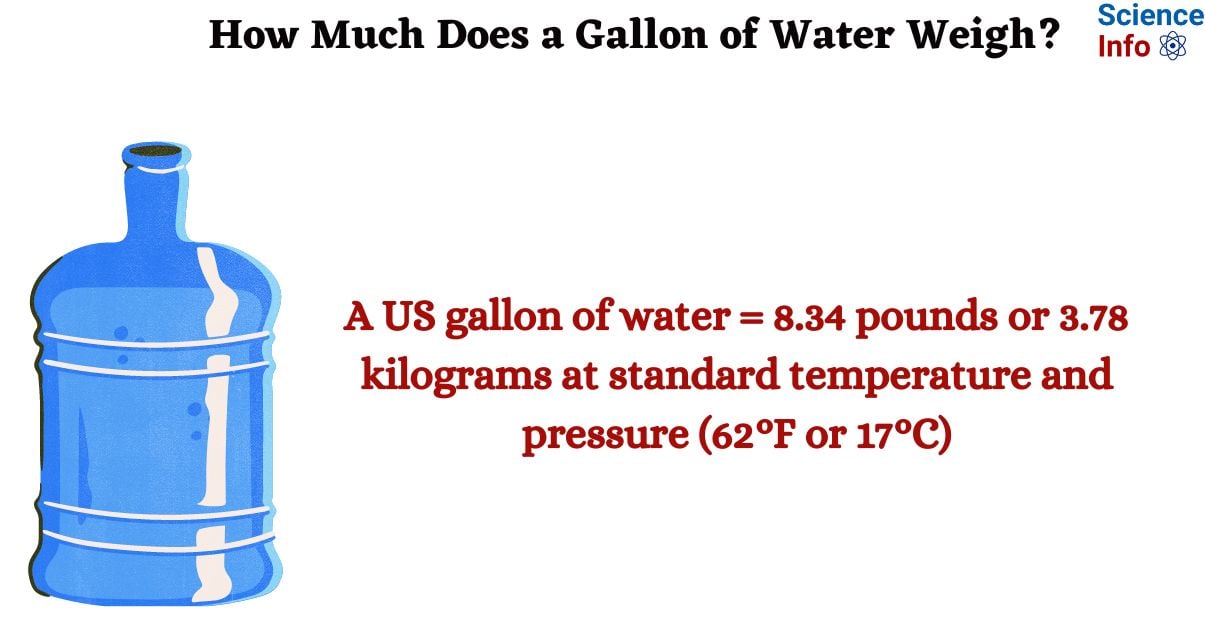How Much Does a Gallon of Water Weigh? A gallon of water weighs approximately 8.34 pounds (3.78 kilograms). The actual weight of a gallon of water, however, will differ based on temperature, surface gravity, height, and pressure because gallons are a measure of volume rather than weight.

Interesting Science Videos
How Much Does a Gallon of Water Weigh?
A US gallon of water weighs around 8.34 pounds or 3.78 kilograms at standard temperature and pressure (62°F or 17°C) and is the most commonly used unit. However, the weight of the water might vary slightly based on several factors, including the type of gallon, temperature, pressure, and contaminants.
Factors Affecting Weight of Water
Temperature
Temperature has a considerable effect on the weight of water. A gallon of water weighs approximately 8.34 pounds at 39.2 degrees Fahrenheit (4 degrees Celsius). The weight of a gallon of water varies with temperature because it affects how water molecules are packed together within a certain volume.
For example, when water is cooler, molecules are packed closer together, reducing the total volume taken up by the water while increasing overall density. Thus, colder water will weigh more. Meanwhile, warmer water’s molecules will spread apart, increasing the volume taken up by the water and decreasing its overall density. Thus, warm water will weigh less.
Pressure
Since there is less air pressure at higher altitudes, water is less dense and weighs a little less. Pressure, like gravity, may change an object’s weight. The atmosphere generates pressure, known as atmospheric pressure. As with gravity, more pressure equals more weight. Atmospheric pressure is also affected by your altitude relative to sea level; the higher you are, the less atmospheric pressure you will experience. Thus, at higher altitudes, a gallon of water weighs slightly less.
Impurities
If the water contains dissolved minerals or other compounds, the mass of the impurities causes it to weigh slightly more. This is why polluted water weighs more than pure water.
Types of gallons
US gallon: This is the most widely used measurement unit. It holds 231 cubic inches (3.785 liters). A US gallon of water weighs approximately 8.34 pounds or 3.78 kilograms. It is used at room temperature (17°C/62°F).
Imperial gallon: It is used in the United Kingdom. It is somewhat larger than a US gallon, measuring 277.42 cubic inches (4.546 liters). An imperial gallon of water weighs 10.02 pounds (4.546 kilograms). It is used at the most intense temperature (4 °C or 39 °F).
Calculation of Weight of Gallon of Water
The weight of a gallon of water (3.785 liters) can be found using the following formula:
Weight = Volume x Density.
Steps for determining the weight of a gallon of water:
Step 1: The volume equals one gallon of water, and the density of water is about 8.34 pounds per gallon (at room temperature).
Step 2: The formula for calculating the weight of a gallon of water is:
Weight = 1 gallon x 8.34 pounds/gallon.
Thus, a gallon of water weighs about 8.34 pounds (3.785 kg).
Chart for Weight of Gallons of Water
| Gallons of water | Pounds | Kilos |
|---|---|---|
| 1 gallon | 8.33 lb | 3.78 kg |
| 2 gallons | 16.66 lb | 7.56 kg |
| 3 gallons | 24.99 lb | 11.34 kg |
| 4 gallons | 33.32 lb | 15.11 kg |
| 5 gallons | 41.64 lb | 18.89 kg |
| 6 gallons | 49.97 lb | 22.67 kg |
| 7 gallons | 58.3 lb | 26.45 kg |
| 8 gallons | 66.63 lb | 30.22 kg |
| 9 gallons | 74.96 lb | 34 kg |
| 10 gallons | 83.29 lb | 37.78 kg |
Frequently Asked Questions (FAQs)
How much does one gallon of water weigh at room temperature?
At room temperature, one US liquid gallon of fresh water weighs approximately 8.34 pounds (lb) or 3.785 kg. The weight of water will always be determined by its temperature.
What is a Gallon?
A gallon is a standard unit of volume and capacity for liquid measurements.
It is widely used in Imperial systems as well as US customary measurement standards.
The abbreviation for gallon is gal.
References
- https://www.geeksforgeeks.org/how-much-does-a-gallon-of-water-weigh/
- https://sciencing.com/calculate-ppm-5194302.html
- https://sciencenotes.org/much-gallon-water-weigh-easy-calculation/
- https://www.worldatlas.com/articles/how-much-does-a-gallon-of-water-weigh.html
- https://www.thecalculatorsite.com/articles/units/how-much-gallon-of-water-weigh.php
